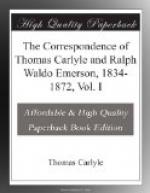For the rest you must tell Mr. Loring, and all men who had a hand in it along with you, that I am altogether right well pleased with this edition, and find it far beyond my expectation. To my two young Friends, Henry S. McKean (be so good as write these names more indisputably for me) and Charles Stearns Wheeler, in particular, I will beg you to express emphatically my gratitude; they have stood by me with right faithfulness, and made the correctest printing; a great service had I known that there were such eyes and heads acting in behalf of me there, I would have scraped out the Editorial blotches too (notes of admiration, dashes, “We think"s, &c., &c., common in Jeffrey’s time in the Edinburgh Review) and London misprints; which are almost the only deformities that remain now. It is extremely correct printing wherever I have looked, and many things are silently amended; it is the most fundamental service of all. I have not the other Articles by me at present; I think they are of themselves a little more correct; at all events there are nothing but misprints to deal with;—the Editors, by this time, had got bound up to let me alone. In the Life of Scott, fourth page of it (p. 296 of our edition), there is a sentence to be deleted. “It will tell us, say they, little new and nothing pleasing to know”: out with this, for it is nonsense, and was marked for erasure in the manuscript, I dare say. I know with certainty no more at present.
Fraser is to sell the Four Volumes at Two Guineas here. On studying accurately your program of the American mercantile method, I stood amazed to contrast it with our English one. The Bookseller here admits that he could, by diligent bargaining, get up such a book for something like the same cost or a little more; but the “laws of the trade” deduct from the very front of the selling price—how much think you—forty percent and odd, when your man has only fifteen; for the mere act of vending! To cover all, they charge that enormous price. (A man, while I stood consulting with Fraser, came in and asked for Carlyle’s Revolution; they showed it him, he asked the price; and exclaimed, “Guinea and a half! I can get it from America for nine shillings!” and indignantly went his way; not without reason.)




